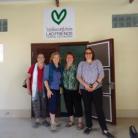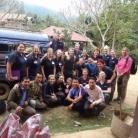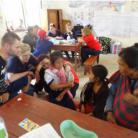
-
You must be signed in to access this function
0
Innovative Case Study
Laos Community Development Project Nursing Placement
Hazel Rands, Lecturer, School of Nursing and Midwifery
Context
This international clinical placement experience is linked to a core 3rd year course Community Nursing Practice (3804NRS) for students enrolled in Bachelor of Nursing and provides the required 80 hours (plus) of clinical practicum experience.  Up to 50 students can participate in this Trimester 3 program each year with more than 250 students having completed the placement since 2010. This course introduces students to core concepts including community as client, social determinants of health, primary health care and health promotion, comparative views of public health, cultural safety and community development. The learning outcomes of these courses require students to explore selected approaches to working in partnership with diverse and vulnerable individuals, families and population groups in order to promote health, social justice, equity and empowerment. A community development project in a developing country provides an optimal environment to engage in aspects of all these concepts. The students also observe local health and societal practices and consider historical influences through planned cultural site visits and cultural immersion activities.
Up to 50 students can participate in this Trimester 3 program each year with more than 250 students having completed the placement since 2010. This course introduces students to core concepts including community as client, social determinants of health, primary health care and health promotion, comparative views of public health, cultural safety and community development. The learning outcomes of these courses require students to explore selected approaches to working in partnership with diverse and vulnerable individuals, families and population groups in order to promote health, social justice, equity and empowerment. A community development project in a developing country provides an optimal environment to engage in aspects of all these concepts. The students also observe local health and societal practices and consider historical influences through planned cultural site visits and cultural immersion activities.
Rationale
Nursing students are often excluded from study abroad opportunities due to restrictive clinical course requirements. Immersion placements support the development of cultural competence and Australian students may be disadvantaged by distance and cost factors when seeking opportunities for these international placement experiences.
This experience develops intercultural communication and assessment skills, with knowledge sharing occurring when working with Lao health workers during primary care clinics. Work-integrated learning in a developing country highlights the importance of establishing professional links and producing work-ready graduates, competent in culturally diverse and international environments. This unique educational opportunity helps students appreciate the impact of lifestyle and living conditions on health outcomes, as they live in village homestays, working in rural communities and participating in Lao cultural activities.
 This well established international clinical placement program acknowledges that nursing curricula in Australia is broadly underpinned by the requirement to develop nursing practice which incorporates aspects of cultural competence. International clinical placements offer students the opportunity to refine care delivery to clients from culturally diverse backgrounds as they observe and participate within other health systems, appreciate diversity and increase their awareness of global issues.
This well established international clinical placement program acknowledges that nursing curricula in Australia is broadly underpinned by the requirement to develop nursing practice which incorporates aspects of cultural competence. International clinical placements offer students the opportunity to refine care delivery to clients from culturally diverse backgrounds as they observe and participate within other health systems, appreciate diversity and increase their awareness of global issues.
The Laos clinical placement also meets one of the University's strategic learning and teaching priorities in their Academic Plan 3: Learning for Success relating to Work-Integrated Learning (WIL), a term used to describe educational activities that integrate theoretical learning with its application in the workplace. ‘These educational activities should provide a meaningful experience of the workplace application that is intentional, organized and recognized by the institution, in order to secure learning outcomes for the student that are both transferable and applied’. The WIL placement to Laos ensures an authentic context in which students can engage in meaningful workplace activities thus facilitating a Griffith ‘signature’ experience for students via a commitment to innovation and Griffith’s internationalisation strategy.
Description
 The Laos Community Development Project offers nursing students a three week clinical placement in the remote, rural Seuang Valley District, Northern Laos. Students experience health care delivery in one of the poorest Asian nations, as they work alongside Lao health workers and local translators to deliver primary health care to remote villagers. The groups travel to more than 30 villages, setting up temporary clinics in local school rooms or meeting halls each day, as there are only 3 permanent clinics in this district. In a nine week period in 2016, the 3 Griffith groups saw almost 3,500 villagers, many of whom had not been able to access health care before.
The Laos Community Development Project offers nursing students a three week clinical placement in the remote, rural Seuang Valley District, Northern Laos. Students experience health care delivery in one of the poorest Asian nations, as they work alongside Lao health workers and local translators to deliver primary health care to remote villagers. The groups travel to more than 30 villages, setting up temporary clinics in local school rooms or meeting halls each day, as there are only 3 permanent clinics in this district. In a nine week period in 2016, the 3 Griffith groups saw almost 3,500 villagers, many of whom had not been able to access health care before.
The students undertake a range of health assessments, treat minor illnesses and injuries and participate in health promotion activities where they quickly develop and refine observational, assessment and non-verbal communication skills. Health education is an integral component of the program and students and academic staff work with Lao translators and health workers to provide a range of interactive activities including; hygiene education; infection control; occupational health and safety; safe medication administration and maternal and child health sessions. This placement within an impoverished developing country also provides opportunities to learn about a vastly different health care system and service delivery and compare this to the contemporary healthcare environment in Australia.
“During the three weeks I spent in Laos I learnt so many things as a student nurse, not just clinical skills, but also cultural skills, how to work with limited resources, and how to connect with people when there are so many barriers to communication. This was truly an experience of a lifetime and I hope every future Griffith University nursing student gets the opportunity to be part of this. This placement would not have been possible without the commitment of staff from The School of Nursing and Midwifery to this project. Their passion for caring is really something I admire and look up to. The relationships and bonds that they have created in the villages are amazing – they have built a foundation for what is achieved on these placements every year. Now it makes sense to me when people talk about sustainability and building capacity because I’ve seen it happening. I was worried about doing health promotion but realised how much I have learned in my degree so far and with my supervisor’s guidance was able to provide education in very creative ways.”
Impact
Griffith University encourages student mobility as one of the ways in which it works to achieve internationalisation and produce graduates who are competent in culturally diverse and international environments. Participation in the Laos project, as a short-term program, provides an opportunity to access the limited mobility study options that undergraduate nursing students can participate in.  A number of past students have subsequently completed further independent international placements through service-learning models and volunteering during semester breaks as they are unable to undertake Study Abroad options within their restricted degree programs. In the past 5 years, 12 Alumni have returned to Laos with the student groups to provide additional support to the project, offering current clinical experience as registered health professionals and bringing an understanding of the project aims, allowing them to mentor both students and local health workers.
A number of past students have subsequently completed further independent international placements through service-learning models and volunteering during semester breaks as they are unable to undertake Study Abroad options within their restricted degree programs. In the past 5 years, 12 Alumni have returned to Laos with the student groups to provide additional support to the project, offering current clinical experience as registered health professionals and bringing an understanding of the project aims, allowing them to mentor both students and local health workers.
One of the unexpected outcomes for the students who participate in the Laos project has been their renewed enthusiasm for nursing on their return. Academic staff observe their improved engagement and problem solving with an increased focus on career planning. This has led to an interesting and increased diversity in graduate year decision making. A significant number of students who have completed this placement option have requested additional placements in rural hospitals ‘Participating in the Laos nursing project has been my most memorable and culturally rewarding practical nursing experience to date. I believe that it made me more confident in communicating with people of other languages, increased my cultural awareness, helped me to adjust to new situations easily, and gain primary health skills in nursing observations and health promotion.’ and/or taken up graduate positions in rural and remote settings, making a small but significant contribution to the Department of Health and Ageing’s rural health workforce recruitment drive. Other students are working in graduate positions or are undertaking post-graduate qualifications to prepare them for rural/remote careers in Australia and overseas and express confidence in their ability to undertake more challenging roles within nursing or academia.
This project has also received Federal Government funding on 3 separate occasions
- 2011 Short Term Mobility Programs (DEEWR); 10 student grants of $2000 each
- 2013 Asia Bound grants (DISSTRE) ;10 student grants of $2000 each
- 2015 Short term mobility grants New Colombo Plan; 20 student grants of $3000 each
Hazel Rands was awarded the 2014 Griffith University Internationalization Award – Short Term Mobility Projects for her commitment to the program, the students and developing a sustainable relationship with this community to increase local capacity.

Contributed by
-
IRU: Griffith University
Hazel Rands
Licence
© 2024 Griffith University.
The Griffith material on this web page is licensed under a Creative Commons Attribution NonCommercial International License (CC BY-NC 4.0). This licence does not extend to any underlying software, nor any non-Griffith images used under permission or commercial licence (as indicated). Materials linked to from this web page are subject to separate copyright conditions.
Preferred Citation
Rands, H. (2018). Laos Community Development Project Nursing Placement. Retrieved from https://app.secure.griffith.edu.au/exlnt/entry/4689/view
Contributed by
- IRU: Griffith University Hazel Rands
Last updated on 2 October 2018
Tags
Griffith
Griffith Health
Innovative Research Universities (IRU)
Workplace Integrated Learning
assessment
career development learning
community engagement
graduate attribute 4
graduate attribute 6
graduate attributes
international
learning activity





